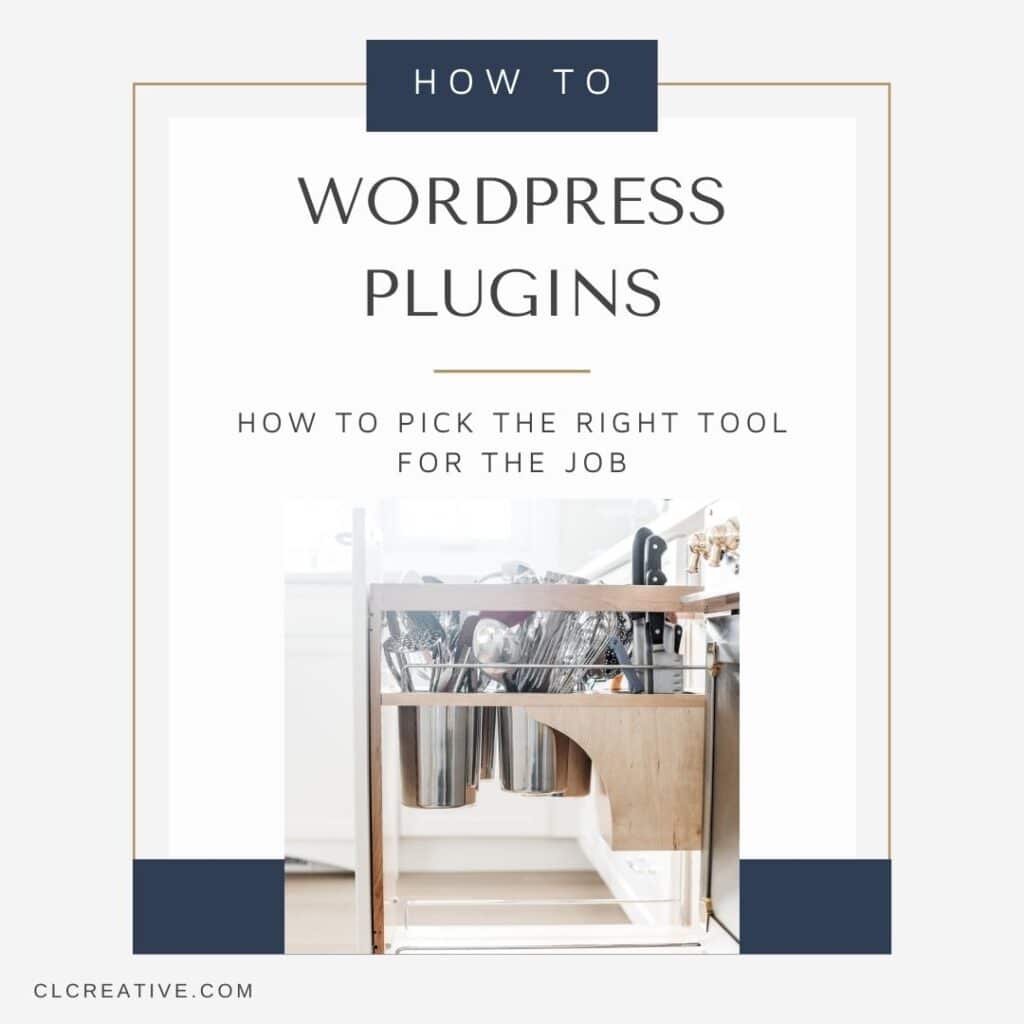
What is a WordPress plugin?
Simply put, a WordPress plugin a chunk of code that will extend the functionality or add features to your website. Plugins come in all shapes and sizes, including those that add social sharing, contact forms, e-commerce capabilities and much, much more. If you decide your website needs to operate in a certain manner, often times a plugin is the answer. And there are tons of them out there- some free, some paid or some a variation of both (free, but with basic features until you upgrade to get the geography functionality).
So how do you know which to choose? Ah, fear not! Read on…
Picking the right tool for the job: what to look for in a WordPress plugin
Once you know what you need the plugin to do or what feature it will bring to the table, it’s important to consider a few factors before installing it on your WordPress website.
Site Speed
Plugins by nature add more code to your site, which will create more server and database requests and to function. That will directly impact the speed of your website. To determine a plugin’s resource needs, you can look to websites like Pingdom or GTMetrix, which will show you which specific files (and thus, which plugins) are hogging all of your resources.
Edit (August 2021): I recently received an unsolicited email from Janis at Experte.com in which he saw this post and my mentioning of the above site speed tools. He (rightfully) brought up the point that these sites only check one URL at a time and not the whole website (quite frustrating). To that end, he developed a free tool that allows for a full site scan and scores the page in the same way as Google PageSpeed Insights. He asked that I play around with it and, if I liked it, to add it to this post. I did test it out a bit and it’s a great resource! Check out which specific pages within your site might be slowing things down using his tool at Experte.com. For the record, this is not sponsored or anything, he just asked me to check it out and let him know my thoughts. Give it a try!
The most frequent page speed killers are poor code and excessive media file sizes, so if you are installing a poorly-coded plugin, your server will have to work extra hard and you’ll notice it in terms of load times.
Which brings me to another important item to consider:
Active Plugin Support
When selecting a plugin, make sure that it is supported. This means that it has been updated fairly recently (I typically look to see if a plugin has been updated within the last couple of months). It’s an important factor because you need to know that plugin is compatible with the most recent version of your WordPress installation and PHP version. PHP is the language on which WordPress is built, and version control is typically handled by your hosting company, so if that is a foreign term, don’t worry too much. When incompatibilities arise, they can vary in nature, from the simple (the plugin just doesn’t function as intended) to extreme (activating the plugin disabled your dashboard access). It’s important to always have a recent backup available in case you need to restore your site to a previous version.
Ratings and Reviews
Take the time to read through the reviews and look at the ratings that a plugin has received. The WordPress Plugin Repository makes this easy with their star ratings system and review section, which are both very visible on the plugin’s download page. If you are considering a plugin from another source, make sure it’s reputable and do a quick Google search to see what others had to say.
Developer Credibility
The WP Repository does a pretty good job of vetting plugins they offer for download, but it’s important to do your due diligence and make sure the developer behind the plugin is reputable, especially when looking to install a plugin from outside the repository. Other marketplace websites offering WordPress plugins, like Envato and others, have some credibility behind them, but it’s important to consider the source. When determining credibility, there are some clues that will help: is the developer active on the support forums they (or WordPress) provide? Do they have any other plugins available? Sometimes, they may offer a new plugin, so the ratings or reviews may not be there, but you can see from their past plugins that they are active in the world of WordPress. I’d be more likely to take a chance on those than someone totally unknown.
Paid vs Free Plugins
All of the plugins in the WordPress repository are free to download, though many of them offer a paid premium (“freemium”) version through their own websites or other marketplaces. When trying to determine if a paid plugin is worth it, think about what you need it to do, what type of budget you have and how much support you think you may need.
Let’s talk money
Depending on your budget, it might make sense to find a free alternative and not spring for the paid version. The free version might not be the ideal situation, but you can typically find a free option that will get you close. It might be just enough to get you off the ground until you can really ramp up your efforts and then look at a paid plugin option. On the other hand, if the paid functionality is something critical to your site or something that will drive sales, then it’s probably worth making the investment and buying the paid plugin.
Do you need specific functionality?
Many times, the reason a plugin is premium and not free is that it offers specific features. The best approach is to create a list of what you want the plugin to do. Then shop around a bit and see if a particular plugin checks most, if not all, of the boxes. Generally speaking, free plugins often provide basic functionality, while the premium versions offer more specific features and more flexibility. If you have a need for something specific or a very particular functionality, you may often find a paid plugin is the best (and possibly only) solution.
How much support might you need?
Free plugins often have community forums where you can ask questions or get help troubleshooting, but one of the big benefits of a paid plugin is that you usually have better access to support from the developer. While a community of help is nice, it’s even better when the solution you need can come quickly and from someone who knows the plugin inside and out. Paid plugins are usually sold with two pricing models for licensing: a recurring fee or a lifetime subscription, but it’s important to review what type of support comes with each. If the plugin you need to purchase offers specific functionality or something rather niche, you may find yourself needing more guidance. You’ll want to make sure you have access to responsive support.
Conclusion
It’s important to be mindful when selecting a WordPress plugin for installation on your website. Plugins can often affect many aspects behind the scenes, as well as provide the needed functionality. Think about site speed, the source of the plugin and its maintenance schedule before activating it on your website. Depending on how specific you need the features to be, you may want to consider a paid option as well, but above all else, make sure to run a complete backup before install any WordPress plugin. It’s important to be able to roll back if the plugin breaks something, or if you just decide you don’t want that functionality any longer. A site backup will prove invaluable in a multitude of scenarios and is always worth it.
